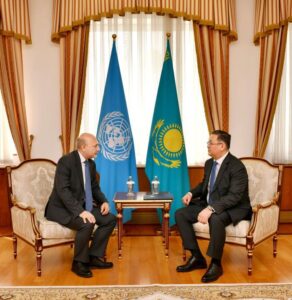ASTANA — Deputy Prime Minister – Minister of Foreign Affairs Murat Nurtleu met with Kakha Imnadze, Special Representative of the UN Secretary-General and Head of the UN Regional Centre for Preventive Diplomacy for Central Asia (UNRCCA) on Aug. 7. Imnadze visited Kazakhstan to participate in the sixth Consultative Meeting of the Heads of State of Central Asian countries to take place this week.
During the meeting, both parties highlighted Central Asia’s growing significance and the region’s challenges. They emphasized the importance of developing and strengthening preventive diplomacy tools to ensure peace and security in the area.
Nurtleu reaffirmed Kazakhstan’s commitment to the UN’s leading role in addressing security and sustainable development challenges. He stressed Kazakhstan’s priority for collaborating with the UN.
“We are pleased to welcome you to Astana for the annual meeting of Central Asian Heads of State. Kazakhstan is eager to continue advancing various constructive initiatives in the region, with the active involvement of the UN,” Nurtleu said.
Imnadze praised Kazakhstan’s current chairmanship in several regional organizations and expressed gratitude for the country’s dedication to multilateralism.
“I congratulate Kazakhstan on its successful chairmanship in key regional organizations and for hosting the sixth Consultative Meeting, which is crucial for the Central Asian region. As Head of the UNRCCA, I am committed to positively strengthening multifaceted regional cooperation,” Imnadze emphasized.
The meeting concluded with both sides reaffirming their commitment to maintaining close contact at all levels and wishing each other fruitful cooperation.
The UN Regional Centre for Preventive Diplomacy for Central Asia, established in 2007 at the initiative of the five Central Asian states, is a special political mission of the UN Department of Political and Peacebuilding Affairs. Its primary objective is to help the Central Asian states identify and address current and potential threats to peace and security. Additionally, the center fosters partnerships between the Central Asian states and collaborates with regional and international organizations.

